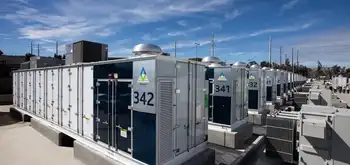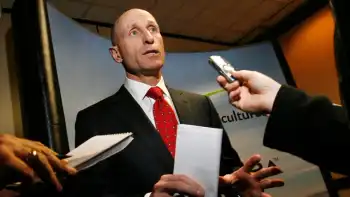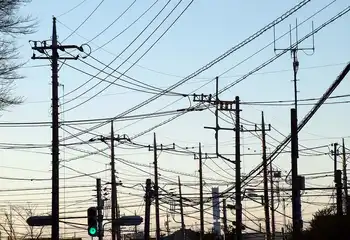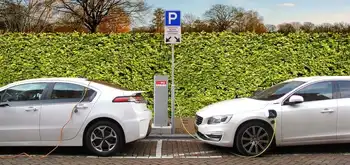Power firms unveil low-carbon choices
By EurActiv.com
Substation Relay Protection Training
Our customized live online or in‑person group training can be delivered to your staff at your location.

- Live Online
- 12 hours Instructor-led
- Group Training Available
The 'Power Choices' study was presented to MEPs, NGOs and industry groups in the European Parliament recently as world leaders gear up for next month's Copenhagen climate summit.
However, the report was dismissed by the renewable energy lobby, which said it failed to tackle climate change. It also came under heavy fire from Green MEP Claude Turmes, who accused the electricity industry of seeking to undermine new legislation designed to stimulate use of renewables.
The study sees carbon emissions from the power sector fall by 90% by 2050 as part of an overall reduction in greenhouse gas emissions of 75% in the EU.
Eurelectric, an umbrella group for electricity firms, said these targets are in keeping with official EU commitments to cut carbon emissions by 80% to 90% by 2050 through a combination of domestic action and the use of international crediting mechanisms.
Under the plan, renewables account for 19.1% of final energy demand in the EU in 2020. Hitting back at criticism from Arthouros Zervos, president of the Renewable Energy Association, Eurelectric said the scenario would see the EU "reach or overshoot" the 2020 target set in the recently-adopted Renewables Directive.
William Kyte, chief advisor for international climate policy at Eurelectric, said it is important that any agreement at the UN climate conference in Copenhagen is based on technical realism.
He said major investment in power plants and "an almost equal" investment in electricity grids is required now if Europe is to reap the benefits in the coming decades. However, he said a limited amount of emissions reductions would be achieved by 2020, with deep reductions coming in the period from 2025 to 2040 as major projects come on stream.
"This all conflicts with the political timeframe for Copenhagen which looks at 2020 timelines. We need to square scientific and political timelines with technical realities," he said.
However, Green MEP Claude Turmes said the electricity industry's plan went against the grain of mainstream EU priorities and seeks to pushback 2020 targets. He said utility companies were pushing for new investments in nuclear energy and coal-based technologies at the expense of renewables.
Turmes asked two academics to subject the Power Choices study to a rigorous peer-review process. According to the Luxembourg MEP, they concluded that the assumptions underlying the scenario set out in the report are dubious.
He accused the industry of artificially inflating its forecast of future demand and said the data on future energy prices was highly questionable. The report assumes a barrel of oil will cost $129 in 2050, something Turmes believes is extremely low.
The report, he says, contradicts the EU's own scenario which anticipates that energy efficiency and renewables will play increasingly important roles in reducing emissions. Turmes accused the electricity sector of deliberately urging EU governments to ignore legislations on renewable energy.
"Are you openly calling on member states to ignore binding targets of 20% on renewables? Do you want a boycott of the rules?" he asked.
He said he was mystified by Eurelectric's expectation that investment in renewable energy would dramatically decline between 2020 and 2030.
"There's no scientific explanation for this. Eurelectric is not being realistic and because it does not want to accept reality, the figures are twisted," said Turmes.
Giusseppe Montesano, chairman of the 2050 Project Steering Committee at Eurelectric, depended the report, saying it was "a scenario exercise, not a forecast".
He said the report is based on the same model used by the EU executive for its scenario exercises. Montesano said there was no manipulation of the data and the industry is not attempting to boycott the Renewables Directive.
The report, he added, is based on existing policies in place in the EU but does not include additional measures that might be added by member states to meet the targets set down in the Renewables Directive.
"Member states have a lot of autonomy in implementing the directive," he noted.
Hans ten Berge, secretary-general of Eurelectric, said the industry was looking at how to make the transition to a carbon-neutral 2050 in the most cost-efficient, reliable way, while meeting the demand from consumers.
He said the presumption that oil prices would be as low as $129 in 2050 was based on an expectation that demand will be "down the drain" in 40 years' time.
However, not all environmental groups were critical of the report. The WWF said it should prompt European policymakers into action.
The green NGO said the report confirms that last year's EU climate and energy package will not result in long-term emission cuts sufficient to meet overall climate objectives.
"Eurelectric's report is a wake-up call for Europe's complacent lawmakers. It confirms that our domestic policies so far are insufficient to head off dangerous climate change. It's imperative political leaders respond adequately to the existential challenge confronting all of us", said Mark Johnston, coordinator of Power Plant CO2 Standards at WWF.
The controversial report was launched on the day the European Investment Bank (EIB) announced new loans of more than €1.5 billion for onshore wind farms in the UK.
The EIB will put around €780 million, with the remainder coming from RBS, Lloyds Bank Group and BNP Paribas Fortis. A forum in London was hosted by UK Energy Secretary Ed Miliband and Chancellor of the Exchequer Alistair Darling to help wind farm developers and bankers to broker deals on new projects which will begin over the next three years.
Simon Brooks, the EIB vice-president responsible for the United Kingdom, said the new loans were a core element of the bank's support for renewable energy technology across Europe.
Eurelectric President Lars Josefsson said carbon-neutral electricity in Europe by 2050 is attainable through the market system. "For this to become reality, policymakers must support the carbon market so as to deliver the CO2 cap at least cost, work for an international agreement on climate change action, ensure that all sectors internalize the cost of greenhouse gas (GHG) emissions, and enable the use of all low-carbon power technology options," he said.
However, he stressed that the key to Europe's low-carbon future will be on the demand side, where "a paradigm shift is needed away from direct use of fossil fuels to energy-efficient electric systems," including road vehicles and electric heat pumps.
Michael Horgan of the European Climate Foundation said that while offsetting might be interesting for the EU and North America in the short term, it is not something that can be counted on in 2050. He said 2020 efficiency targets must be binding and called for demand-side efficiencies to be delivered without delay.
Horgan disagreed with the energy mix proposed by Eureletric, accusing the industry group of "a typical bias" towards reliable capacity offered by coal and nuclear energy.
"We believe, and will demonstrate, that a nuclear and coal-dominated option will be the high cost solutions," he said, making the case for renewable energy sources.
Nick Campbell of BusinessEurope said investment should be channeled towards changing the infrastructure of energy production and consumption. He congratulated Eurelectric for "putting numbers on the table" and said he believed all options – including nuclear – must be considered. Campbell said he was horrified by how much the cost of energy is expected to rise in 2025, saying this will heap pressure on energy-intensive industries.
Hans ten Berge, secretary-general of Eurelectric, said cost-efficiency will be the driver for developing a carbon-neutral energy market. He said he has no preference for how the goals set out in the report are achieved. "I don't want to be squeezed between lobbyists from BusinessEurope saying we need the cheapest energy possible, and the greens on the other side saying we need more renewables. Our priority is cost-efficiency," he said.











